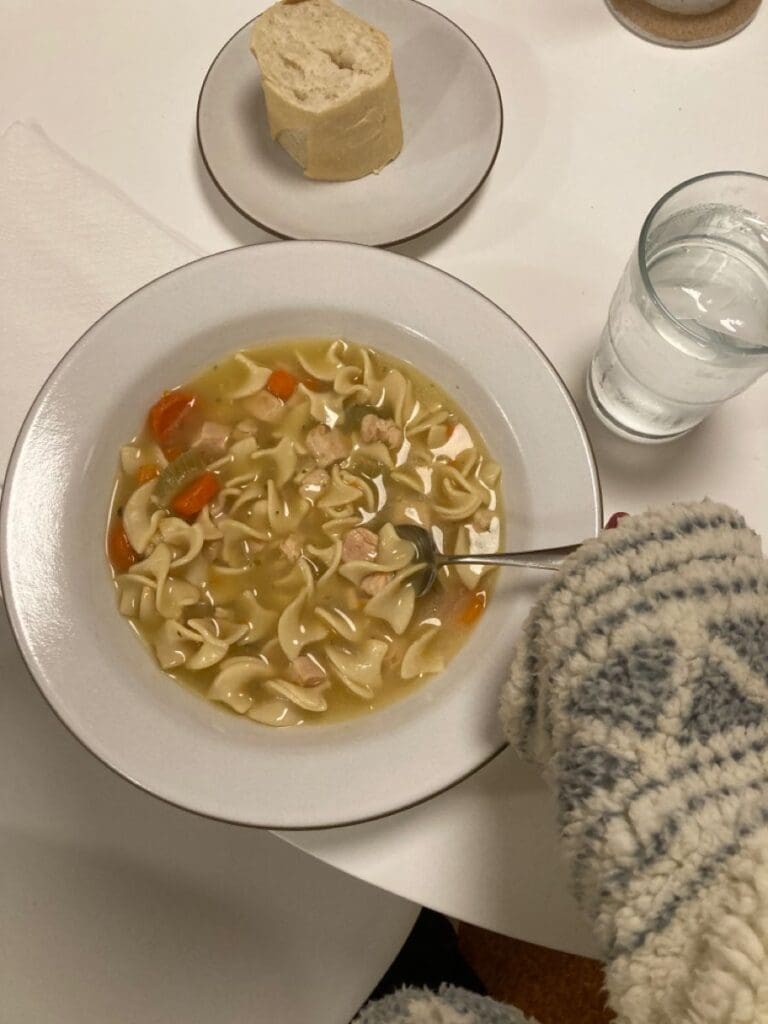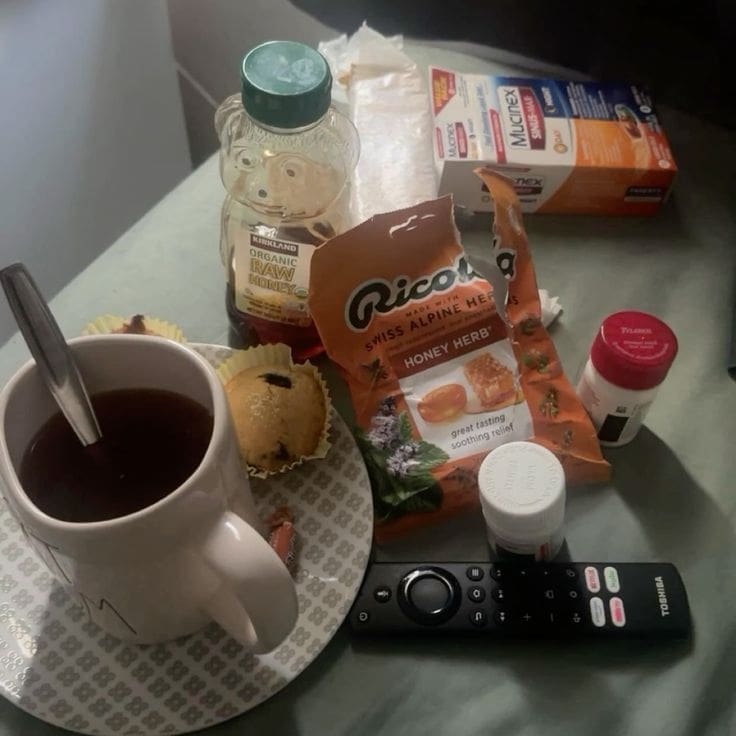Being sick for a week straight is brutal. You feel weak, foggy, and even making a piece of toast feels impossible. If you’re wondering what to eat when sick and how to take care of yourself, you’re not alone. As a women’s health dietitian who just went through this, I’m breaking down exactly what helps. From food and hydration to supplements like zinc, vitamin C, and elderberry.

1. What to Eat When Sick: Protein and Energy First
When you’re sick, appetite often disappears, but your body still needs fuel. Protein is critical for building immune cells and repairing tissues, while energy (carbs + fat) powers the healing process. Here what I want this to look like (if you have the energy because if you don’t I also get it):
- Aim for 10–15 grams of protein every few hours, even if it’s small. Try scrambled eggs, smoothies, nut butter on toast, or bone broth (my persona fave).
- Choose gentle, energy-dense foods that don’t overwhelm digestion. Try oatmeal with milk, banana with almond butter, blended soups, or soft rice bowls.
- Animal proteins tend to boost zinc absorption better than plant-based sources, which matters if you’re also leaning on zinc lozenges (more on that below).
2. Hydration When Sick Is More Than Just Water
Plain water helps, but hydration when you’re sick is about more than just fluids:
- Try warm broths, herbal teas, or diluted fruit juice. They’re important because they replace electrolytes and soothe sore throats.
- Add a pinch of salt, lemon, or honey to make fluids more hydrating and palatable.
- If fever or sweating are happening, an electrolyte mix or diluted sports drink helps restore sodium and potassium.
- Keep caffeine low if you can. Too much can worsen dehydration and possibly lead to jitteriness.
3. Elderberry with Honey and Lemon
Elderberry is my best kept secrete when I’m sick. And its legit too. It has been legitimately studied for its role in shortening cold and flu symptoms. A 2021 systematic review found elderberry may reduce the duration and severity of upper respiratory infections. Though evidence is still mixed, it’s generally not harmful to take, so the worst that could happen is it does nothing.
Make a soothing elderberry drink:
- Warm water
- 1–2 teaspoons elderberry syrup or extract
- Squeeze of lemon (vitamin C)
- Spoon of honey (soothes throat, mild antibacterial effect)
NOTE: Avoid raw or unripe elderberries, as they can cause GI upset. Stick to cooked syrups or standardized extracts.
4. Zinc Lozenges: Why the Type Matters
Zinc is one of the few supplements with real data for shortening cold duration. But the form matters:
- Zinc acetate and zinc gluconate lozenges are most studied. Zicam, for example, uses zinc gluconate.
- Zinc acetate tends to release zinc ions more effectively than other forms, which may be why studies show better outcomes.
- Timing: take on an empty stomach for best absorption, but if nausea hits, pair with food. Avoid citrus within 30 minutes of a lozenge, since citric acid can interfere.
- The sooner you take it, the better zinc will potentially work. Try to start within 24 hours of symptoms.
- NOTE: High doses over time can block copper absorption, so don’t overdo it. Also taking too much can give you stomach upset, so more is not better, promise.

5. Vitamin C When Sick
Vitamin C doesn’t “cure” colds, but research shows daily supplementation may reduce duration or severity if you’re already taking it before you get sick.
- Best food sources: citrus, kiwi, strawberries, bell peppers, broccoli.
- Supplements can help if diet falls short, but more isn’t better. You end up peeing out the excess and too much may upset your stomach.
- The tip is to take daily, not just once you’re already sick.
6. Other Dietitian Tips for Recovery
- Gut-friendly foods: Cooked veggies, rice, mashed potatoes, bone broth. Avoid greasy, fried, or super fibrous foods when digestion is feeling meh.
- Sleep: Keep your room cool, dark, and quiet (duh). Elevate your head with pillows if congestion worsens at night, and tbh just put your phone of Do Not Disturb.
- Symptom relief: Use a humidifier, saline nasal sprays, or steam inhalation to loosen mucus. Gargling warm salt water can soothe sore throats.
- Gentle movement: If you feel up to it, short stretches or light walks support circulation and mood. Otherwise, bed rest is fine.
7. When to See a Doctor
Supplements and home remedies are supportive, not cures. Call your doctor if you experience:
- High fever lasting more than 3 days
- Worsening symptoms after 5–7 days
- Shortness of breath or chest pain
- Severe weakness, confusion, or dehydration
The Bottom Line
Being sick for a week sucks, but small, intentional actions can help you recover faster and feel less miserable. Feed yourself in simple, protein-forward ways, stay hydrated, lean on evidence-backed supplements like zinc and vitamin C, and use elderberry as a soothing ritual. Rest is non-negotiable, and if symptoms worsen, reach out to your provider.
As a women’s health dietitian, I always remind my clients: illness is not a personal failure, it’s your body asking for care. Let this be your permission slip to slow down, nourish yourself, and heal.
Feel better girlfriend. <3